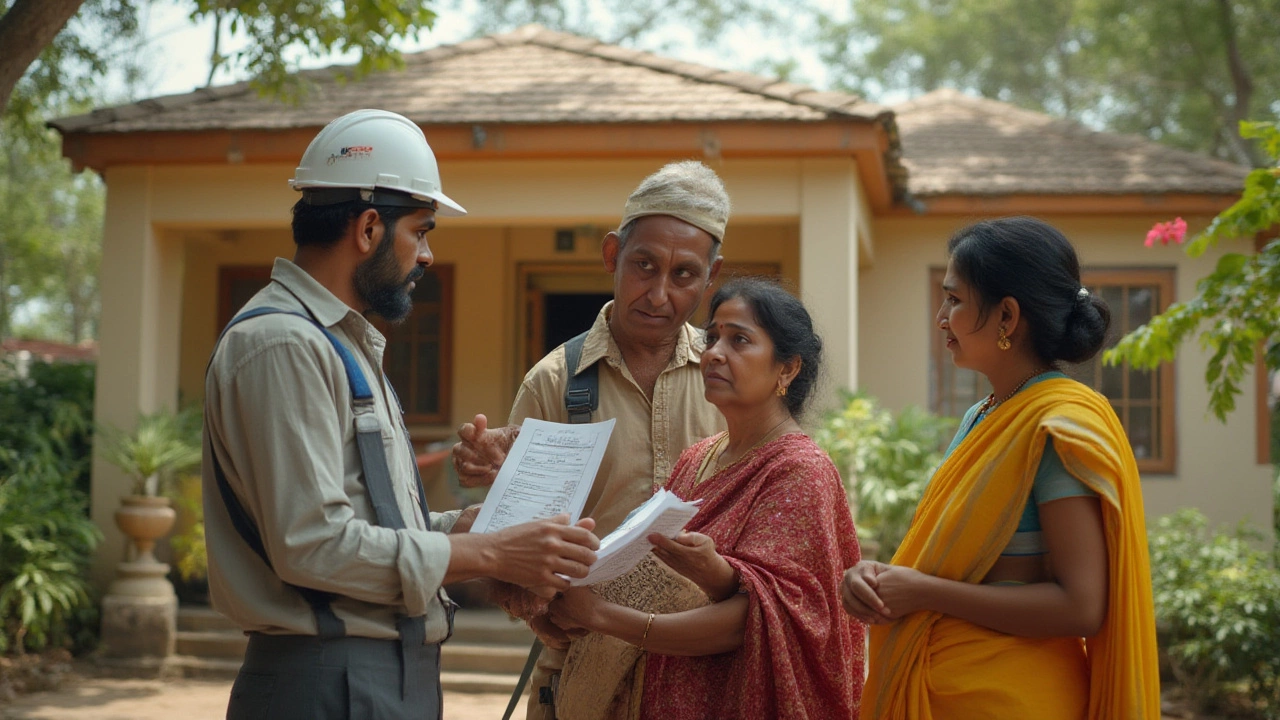Picture a roofing contractor sliding a hefty quote across your kitchen table, waiting for your reaction—maybe you wince, maybe play it cool. Either way, a roof replacement is pricey. But those five figures? They're not always set in stone. The art of haggling with contractors isn't just for savvy shoppers at flea markets. With a few smart moves, you could save thousands on your next roof.
Understanding What You’re Paying For
Before you leap into talks with a roofer, get clear on what goes into that price. A new roof isn't just a pile of shingles. There’s the underlying plywood or decking, roof felt or underlayment, flashing, ventilation, labor, removal of the old roof, and disposal fees. Better shingles with longer warranties bump the total, too. According to the National Association of Home Builders, the average cost in 2024 for a full roof replacement on a typical U.S. home hovered around $11,500. But you’ll see prices jump to $15,000 or more for steep roofs, complicated designs, or higher-end materials like standing seam metal or slate. Down in the Sun Belt? Might be a lower bill. Living in the Northeast with lots of valleys and dormers? Expect to pay more.
Roofers also factor in overhead—vehicles, insurance, work crews—and their own profit margin (typically 10% to 20%). Pull up a sample quote, and you'll spot charges for every roll of underlayment or hour of labor. Even dump fees for tearing off your warped shingles. Hidden mold or water damage can add hundreds—or thousands—to your total. Ask the contractor for a detailed, line-by-line quote. You’ll spot exactly where your money’s going and where there’s wiggle room.
The material you pick makes a big difference. Architectural asphalt shingles might cost $3.50 to $5.00 per square foot installed. Metal roofs? Closer to $7.00 to $12.00. Fancy copper or clay tiles can soar to $30.00 per square foot. And remember, local regulations and HOA rules can force your hand on materials or colors, sometimes bumping your budget higher.
How to Research Roofing Contractors and Their Bids
Don’t stop with just one estimate—this step separates deal hunters from over-payers. Industry pros recommend getting at least three bids from reputable, local roofers. This not only lets you see who’s charging what, but also how clearly each company explains the work. The Roofing Alliance found that almost 35% of homeowners who got just one bid regretted it later when surprise costs cropped up. When you call around, ask if estimates are free. Most legit contractors won’t charge for a site visit and written bid.
Armed with a stack of estimates, compare them side-by-side. Look for sneaky exclusions—are disposal fees or plywood replacement included? What about emergency repairs? Does one bid seem way lower than the rest? That could be a red flag for shoddy materials or rushed labor. On the other hand, a sky-high bid in the middle of hurricane season might not budge. Avoid the urge to always go with the lowest number. Cheap bids can mean fly-by-night contractors, uninsured crews, or decades-old leftover shingles.
Take time to check contractor credentials. Most states require a license for residential roofing—look it up online to make sure they’re in good standing. Ask for proof of liability insurance and worker’s comp coverage. Without those, you could be on the hook for damages or injuries on your property. Don’t forget online reviews or local references. A roofer with a few unhappy customers (and bad repair jobs showing up in neighborhood Facebook groups) can cost you more in the long run.

Strategies to Negotiate the Best Roof Replacement Price
Now for the part you came for: getting that quote down. Contractors build room for negotiation into their pricing—don’t be afraid to ask questions or push back. Kick off the conversation by asking, "Is there any flexibility on this number?" It’s direct, and it signals you’re an informed buyer. If you have other bids, say so. Show them you’re serious about getting value.
- Timing is leverage: Roofers are busiest in late spring and after storms, when roofs everywhere leak. If you can wait until late fall or winter, contractors may offer off-season discounts worth 5-10%, just to keep their crews working.
- Cash talks: If you’re able to pay your portion upfront, some roofers will shave a percent or two off the bill versus waiting for financing.
- Bundle up: Sometimes roofers offer deals if you get gutters or skylights replaced at the same time. This can score you a better price per item.
- Mention referrals: Let the company know you’ll recommend them or leave a positive review if they can work within your budget. Word of mouth leads are gold to contractors, and they know it.
- Insurance claims: If your roof was damaged by a storm, your insurer might set reimbursement maximums. Use this info in talks—contractors are often used to tailoring work to fit the insurance payout.
Don’t be shy about asking for better warranties or upgrades. For instance, a contractor may agree to install a higher-grade shingle or an ice-and-water shield under valleys (a must in snowy climates) at little or no extra cost, simply to close the deal.
If they won’t budge on the price, try negotiating for value—maybe they’ll replace rotted wood decking at no cost, add attic vents, or haul away old gutters. These extras save you money without cutting corners where it counts.
| Roof Material | Cost per sq ft (Installed) | Avg. Lifespan (Years) |
|---|---|---|
| Architectural Asphalt Shingles | $3.50 - $5.00 | 20-30 |
| Metal (Standing Seam) | $7.00 - $12.00 | 40-80 |
| Wood Shake | $6.00 - $9.00 | 25-40 |
| Clay or Concrete Tile | $10.00 - $18.00 | 50+ |
| Copper | $15.00 - $30.00 | 70-100 |
Common Pitfalls to Avoid in Roof Price Negotiation
Even the sharpest negotiators can trip over a few classic mistakes when shopping for a roof. First, ignore the "one-day only" pressure tactics. No reputable roofer should bully you into a contract. Take your time. If they’re legit, the deal will still be good tomorrow.
Watch for vague estimates that just mention total cost without exact breakdowns. Some contractors under-quote and then spring surprise add-ons (“Didn’t factor in all this rotted decking!”). Push for every detail on paper—materials, labor, disposal, contingencies, and permit costs.
Never pay more than a third of the total cost upfront. If a roofer demands the full amount before work begins, move on. It’s standard to pay a deposit (often 10%-20%), then the rest as work progresses or at job completion. Keep records and ask for receipts for any payments.
Be careful with door-to-door roofers, especially after storms. The National Roofing Contractors Association warns that “storm chaser” crews often use cheap materials, rush jobs, and disappear after cashing your check. Look only at established local companies with a physical business address—and check their references.
Don’t forget about the warranty, either. Some roofers hand out short, one-year workmanship warranties, which leaves you unprotected if leaks pop up in year two. Push for at least a five-year workmanship warranty and get manufacturer shingle coverages in writing. Match those details against the bids.

Questions to Ask Before Signing a Roofing Contract
Before you put pen to paper, ask a few crucial questions. Is the contractor licensed in your locality, and can they provide proof of insurance? Will they handle permits and inspections, or is that on you? What’s the full warranty, and is it written down? Is old roof removal and clean-up included in this price—or is that "extra" after the crew leaves?
If your house has a tricky roofline or known water leaks, ask how they’ll handle problem areas like flashing, valleys, or chimneys. Who’s the foreman, and will they be on-site every day? Who should you call if there are issues during or after the job? Get these names and numbers upfront.
Double-check the payment schedule. When exactly do you pay, and for what progress benchmarks? Lining this out protects you if the contractor falls behind. Clarify start and finish dates. If the job stretches beyond those, are there penalties or discounts?
If you’re financing, ask if the roofer works with lenders or offers payment plans. Some larger companies have arrangements with banks and may be able to secure a better rate than your regular credit card. But always read the loan fine print for early repayment fees or inflated interest rates.
- Can you show me a copy of your insurance and state license?
- Does the quoted price include all materials, labor, removal, and cleanup?
- What happens if you find unexpected damage?
- Who’s my point of contact during the work?
- How long is the negotiate roof price valid for, and what might change it?
Signing a contract with your eyes wide open is the best way to get real peace of mind that your new roof protects your house—and your bank balance—for years to come.

Written by Fletcher Abernathy
View all posts by: Fletcher Abernathy